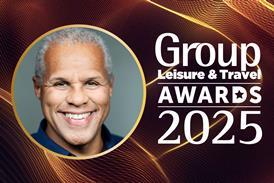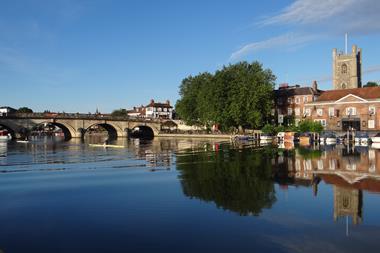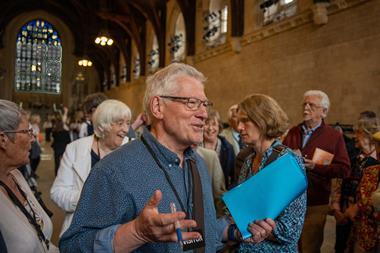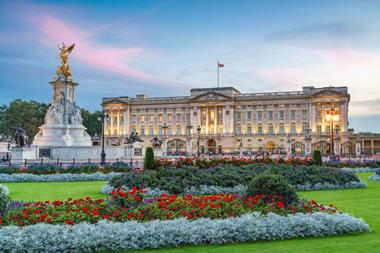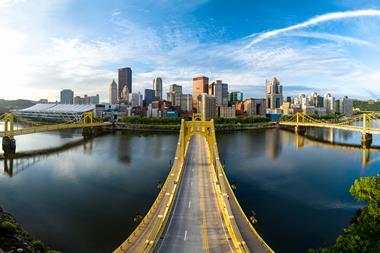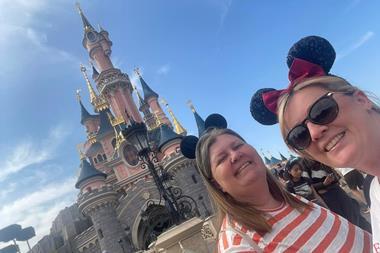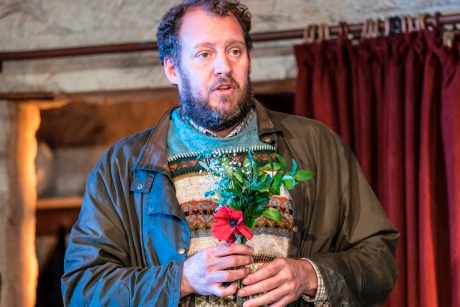
Justin Edwards, who is currently starring as Tom Kettle in The Ferryman at the Gielgud Theatre in London, tells GLT about his return to the stage and tackling political issues in the show.
Justin, for those who haven’t seen The Ferryman, how would you describe it?
Well, it’s an extraordinary narrative set amongst the troubles in Northern Ireland in 1981 and it’s based around a family named the Carneys. The show is set in their farmhouse on harvest day which is a big feast day with all the family members, so it’s a celebration.
But then one night they are interrupted. One of the character’s brother was killed by the IRA ten years previously and that story comes back into their world to revisit them. It’s quite political, and at the height of The Troubles and the hunger strikes, but it’s also about love and family and friendship. And it’s very funny at times too and has an enormous cast. It’s an epic play.
You play Tom Kettle, tell us a bit about his character.
He is the only Englishman in the play and everyone else is Northern Irish. He lives on the farm and he’s quite mysterious as no one knows where he has come from and it’s quite unusual for them to have an Englishman in rural Northern Ireland. He’s a very able and useful farm worker but he’s also different from the others.
What drew you to the role?
It’s a really interesting part and I don’t get to do things like this often. It’s an extraordinary play and incredibly popular and it’s great to be a part of. Jez Butterworth as a writer is amazing and Sam Mendes as a director is too - it’s wonderful to work with people of their calibre.
You’ve been in everything from TV series such as The Thick Of It and Black Mirror to various films and of course theatre productions. Do you have a preferred medium?
I’m enjoying theatre at the moment because it’s a nice change and you get to do it over and over again, which is exciting, whereas with filming you get your one chance and move on. The hours of course are different and can be hard but each type of performing has its own merits. I do whatever work I can get [laughs] but it’s great to be doing theatre again after avoiding it for a bit when my children were very young.
Is there a particular part of the play that stands out for you?
There are lots. There’s an extraordinary feasting scene, with a big roast dinner, which is real as well! That develops and something awful then happens. There are a lot of surprises.
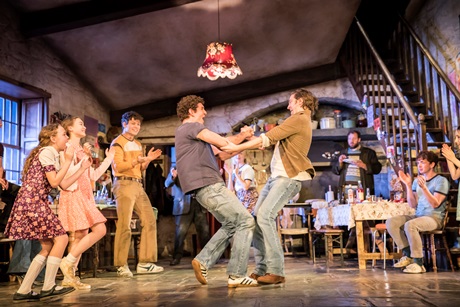
Pictured: The Ferryman cast (Photo credit Johan Persson).
The play tackles some serious issues, are there parts that have been more challenging than others?
It’s very interesting for me to learn about the trouble in Northern Ireland. Most of the cast are from there and have a connection with it. I grew up remembering the hunger strikes, but it’s fascinating to learn their viewpoint. However, my character isn’t so much involved in the politics of it, he’s in his own world.
How does this play and role differ from your previous work?
Over the last few years I’ve done a lot of TV comedy and live audience shows and radio, so it’s nice to do something in a different world to that. It’s a much straighter role and drama. It’s easy as a performer to be pigeon-holed as something or as sticking to a certain genre, so it’s great to do something different.
Do you have any special rituals or superstitions before going on stage?
I don’t particularly, I’m not superstitious although I know some who are. I think because it’s such a routine you develop habits, for example putting your costume on in a certain way and then convincing yourself if you don’t something will happen. I do always run my lines before going on stage though and do some warm ups. Superstitions are mostly based on health and safety, but I think they are dying out now. But I know there are still some actors who won’t say Macbeth on stage.
Have you had good responses from the audiences?
Yes, really good every night, we get standing ovations and huge applause. People really connect to The Ferryman. You get sucked into it and because it takes place using one set, it’s an immersive experience and audiences get really affected by it.
What do you think people coming the show will take away from it?
It’s the kind of play you won’t see very often and it’s so well-choreographed as well with so many people on stage. It’s quite magical, especially the writing, it’s very poetic. I hope audiences watch it and go “Wow, I’ve never seen anything like this”. Some people come back again so they can take it all in. You want people to go away thinking about the play for longer than just the time they are there watching it.
If you could play any role in theatre, what would it be?
I’d quite like to do a musical. I do like big musical theatre roles which I never really get to do. I do like Les Misérables. I nearly auditioned for Miss Trunchbull in Matilda a while back; I think she’d be a great character to play.
What do you like to do besides acting?
Well I have small children (and cats!) so, I’m often busy with them but I do like getting out and about too. I also make a lot of beer, but I don’t have much time for that at the moment, perhaps when the show nears its end I can pick it up again.
If you could sum the play up in three words what would they be?
Epic. Funny. Heart-breaking.
The Ferryman is currently running until 19th May at Gielgud Theatre in London. Group organisers can call 08444825100 for tickets details. For more information on group tickets, visit theferrymanplay.com.
Written by Laura Sexton
Image credits: Johan Persson.

